Historical Society of
Pottawattamie County
County Seat Council Bluffs, Iowa
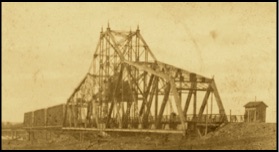
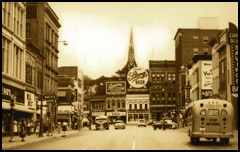
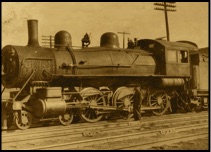
Popular Rock Station Sweet 98 Started in Council Bluffs
Kevin Kassera, Bob Warner, and Dick Warner, the three KRCB staff members retained for the new Sweet 98, discuss the origins and early days of Sweet 98 in this podcast.
Every business faces challenges. Broadcasting, however, has an added unique dilemma. A retailer may entice a customer to purchase additional shoes, or a publisher might sell multiple magazine subscriptions, but a person can only listen to one radio station at a time; every time one station gains a listener some other station loses one. This makes for a very competitive business environment.
The station that became Sweet 98 in the fall of 1980 consistently found itself at the bottom of that competitive pile in its early days. The challenges began almost immediately; the station, born as KSWI-FM, came along at a bad time. The Nonpareil Broadcasting Company put the station on the air in 1947, just months before Omaha got its first television station. As it turned out, the radio industry’s most profitable years were yet to come, but many sponsors at the time thought radio was dead; why would anyone listen, now that technology had advanced to “radio with pictures?” As the first FM radio station in Iowa, it was a trendsetter, but that also took its toll. Few people owned FM radios and most were reluctant to invest in a new and more expensive radio set with television on the horizon. The station floundered, changed call letters to KMFX, and went off the air entirely in 1953.
The station returned in 1969 as KRCB-FM, this time playing a rock and roll format and going head-to-head with KOIL, the one-time Council Bluffs station that now dominated the Omaha popular music market. KOIL’s long-time popularity coupled with their expensive advertising and promotions made it a game KRCB could not win. The latter adopted a progressive rock, album-oriented format and changed its call letters to KQKQ-FM in 1974.
The new format attracted quite a number of listeners, mostly young-adult males. They were a loyal audience that loved the music, but it was difficult to attract sponsors. The retailers with the biggest advertising budgets demanded a more balanced listenership. By this time the station was located in a decrepit former apartment building on the northwest corner of 36th and West Broadway and economic problems worsened to the point it appeared bankruptcy may be lurking around the corner.
Station owner John Mitchell hired Bill Cunningham, first as a consultant, then as general manager of the entire operation. Cunningham had worked a decade earlier at KOIL and apparently had picked up on the tips and tricks of that station’s legendary owner, Don Burden. Competition from KOIL was no longer factor; that station had been forced off the air due to legal problems, and though it had returned under new ownership, it was no longer the force it had once been.
Cunningham decided a major change was necessary. He he released the entire staff except for three and brought in air talent from around the county, creating an entirely new format heavy on personalities and promotions. The format kicked off in September, 1980, with the new morning team of Mark Evans and Dick Warner, calling themselves “Mark and Dick, the Breakfast Flakes."
What followed has to be one of the best rags-to-riches stories in local history. The ratings spiked immediately and the grandiose promotions were nonstop for years, from a $98,000 giveaway that snarled traffic at 72nd and Dodge for hours, to thousands descending upon the grounds of Westfair for the annual Sweetstock concert. The Supermouth talent contest its first year attracted over 2500 entrants bent on scoring the prize of becoming a Sweet 98 DJ and driving a brand new Firebird. DJ Hot Scott jammed Peony Park with teens at Sprite Night; Dick Warner did likewise with adults at the Nostalgia Hop. Cunningham explained he would rather channel money into extravagant promotions and giveaways instead of spending it on advertising. The plan worked, and worked well; in a short time Sweet 98 became the first FM radio station in the market to become number one in the metro ratings.
Relaxed rules that came along in the 1990s allowed the station to move its studios to Omaha, and Sweet 98 set up shop in a historic building on the corner of 10th and Farnam near the Old Market. It may have been radio, but there was a lot to see. Air personalities stepped onto a platform that then elevated them several feet to the control board in the very colorful main studio, all visible from Farnam Street through a large front window. Inside, doorknobs were in the shapes of gold records; at times a pianist could be heard playing music on a Grand piano in the four story atrium. Air personalities were chauffeured to events in limousines.
Bill Cunningham died in a traffic accident in 1996. John Mitchell eventually sold the station and passed away in 2014 at the age of 89.
Sweet 98.5— the decimal added as a necessity following the transition from analogue to digital tuners— remains successful today, though times have changed. The once prohibited practice of multiple station ownership is now standard, allowing sister stations to become more efficient by sharing some staff, and computer technology permits programming flexibility Bill Cunningham could never have even dreamed of. More music outlets for listeners to choose from have required programmers to more intimately understand their listener’s tastes and fine tune their formats to appeal to them. More stations and online sources have made a competitive business even more-so, but radio has continued to thrive, continuing to entertain and inform... and just be there for you on those days when you need a friend.
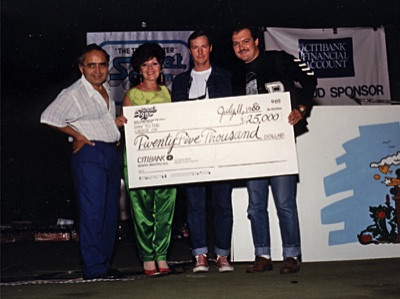
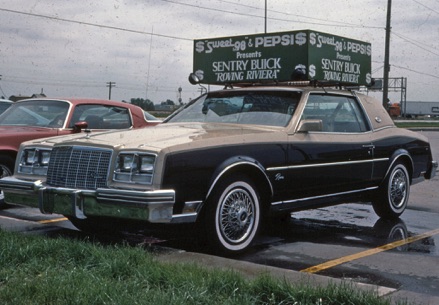
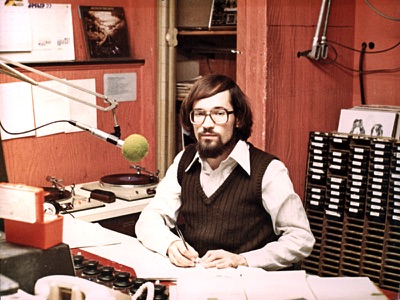
The Sweet 98 promotional strategy involved grandiose promotions and high dollar giveaways. On the stage are station owners John and Mary Mitchell, an account executive, and air personality Mark Evans.
Sweet 98 strived to create high visibility for itself, including a vehicle roaming the streets awarding prizes to people whose cars had a radio station bumper sticker.
New KQKQ general manager Bill Cunningham assembled an almost entirely new staff to create Sweet 98. DJ Dick Warner was one of just three staff members held over from the former KRCB.